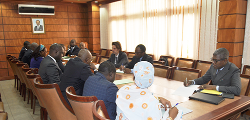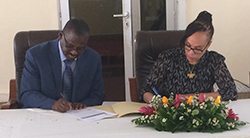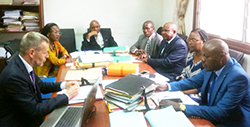TIWB Partner Administration - France
The French Experience
By Samia Abdelghani, OECD Tax Advisor

Launch of the TIWB programme in Cameroon |
France is one of the pioneer countries in the TIWB initiative and has played a large part in its success. Indeed, even before the official launch of TIWB in July 2015, France was involved in the pilot phase conducted in 2014, when one of its experts was sent on mission to the tax administration in Senegal. Since then, experts from France have worked on missions in other developing countries such as Cameroon, the Central African Republic, Chad, Congo, Madagascar, and Mali. |
Learning by doingAs a committed partner of the TIWB initiative, France has been sending seasoned tax experts to French-speaking Africa for six years to help develop local competencies and strengthen expertise in the area of tax audits.
French experts work in the field alongside officials from African tax administrations on tax inspections involving complex issues. They share their expertise, their knowledge and know-how using a hands-on approach based on learning by doing.as taxation techniques and technology are best transferred when working together on real cases. The experience acquired by France within the scope of the TIWB initiative shows that the hands-on approach to learning by doing is more effective than ordinary forms of assistance and capacity-building in providing a more solid foundation in tax expertise in the tax administrations of developing countries.
Tailored AssistanceThe duration of TIWB programmes and the areas in which support is provided vary according to the country in which the French experts intervene. Generally speaking, TIWB programmes last from 12 to 18 months, with the experts performing six to nine on-site missions, depending on the total duration of the programme. |
|
An initial scoping mission in the host country allows the expert to meet the main actors in the local tax administration involved in the programme, establish the key programme impact indicators, familiarise him or herself with the local legal and administrative framework, and start work on audit programming and tax inspections. This initial visit is followed by on-site missions during which the French experts work closely with local auditors on pre-selected cases and provide ad hoc training, based on the needs expressed, in order to explore in more detail specific topics related to tax inspections.
Between each on-site mission, the French experts provide remote support via secure electronic means so as to facilitate the monitoring of the cases in which they are involved and respond to the specific needs of local auditors. |

Launch of the TIWB programme in Mali |
|
The areas of TIWB support vary with each programme. Some TIWB programmes involving France cover specific sectors of activity in which the requesting countries want to strengthen their expertise, whereas other TIWB programmes are much more general and concern major audit cases with an international dimension.
The TIWB programmes in which France participates are financed by the French Ministry of Europe and Foreign Affairs, which pays for the mission expenses of the French experts. |
| The account of a TIWB expert from the French General Directorate of Public Finance (DGFiP) My current experience in Chad is highly exciting and very challenging. By reviewing “real” cases, the TIWB programme provides concrete and operational support to Chadian auditors, who are motivated and keen to take on board technical solutions. The group sessions, which are always a place for rich discussions, allow me to meet the auditors’ expectations by sharing my knowledge and experience of tax inspections.
Providing support to a developing country within the framework of a TIWB programme is undoubtedly a unique and valuable experience, at both a technical and a human level. In my opinion, the key words behind a successful TIWB programme are "sharing" and "adaptation". |
|

Launch of the TIWB programme in Congo |
The French TIWB experts have also helped improve the quality and uniformity of tax inspections, notably by putting in place resources such as standard requests for information, functional analysis frameworks, check sheets for tax returns, risk-analysis and search tools, all of which facilitate the work of the auditors.
Experience has shown that the extent of the success of the TIWB programmes in which France has participated is even greater when the programmes are underpinned by a strong political commitment, and all the stakeholders work together to meet the objectives assigned to the TIWB programmes. |
Going ForwardGiven the growing request for assistance from developing countries, France intends to continue its tax co-operation within the scope of the TIWB initiative in order to support the domestic resource mobilisation of developing countries.
In this respect, France has already agreed to provide experts for TIWB programmes in Togo and Guinea. Moreover, it has not precluded extending its assistance to continents outside Africa, capitalising on the experience gained by its experts in the course of completed TIWB programmes.
Ways of improving TIWB programmes are currently being examined, with a view to extending their reach and their efficiency. For example, each new TIWB expert will receive an information kit on the country to which he or she will be sent, thus enabling better programme preparation and optimised on-site missions.
The French tax administration is also examining the creation of a list of recently retired experts in order to meet the growing demand for TIWB assistance in developing countries.
In conclusion, France considers that the TIWB initiative provides developing countries with a genuine opportunity to build their capacities in the area of tax inspections and so be better placed to combat tax avoidance, and will continue on this basis to provide active support. |
» Return to Reports & Case Studies
Related Documents

